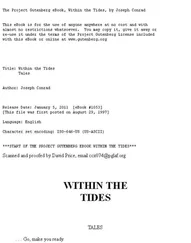We were then very near her and, on a sudden impulse, I volunteered to pull bow in the dinghy which shoved off at once to put the pilot on board while our boat, fanned by the faint air which had attended us all through the night, went on gliding gently past the black, glistening length of the ship. A few strokes brought us alongside, and it was then that, for the very first time in my life, I heard myself addressed in English—the speech of my secret choice, of my future, of long friendships, of the deepest affections, of hours of toil and hours of ease, and of solitary hours, too, of books read, of thoughts pursued, of remembered emotions—of my very dreams! And if (after being thus fashioned by it in that part of me which cannot decay) I dare not claim it aloud as my own, then, at any rate, the speech of my children. Thus small events grow memorable by the passage of time. As to the quality of the address itself I cannot say it was very striking. Too short for eloquence and devoid of all charm of tone, it consisted precisely of the three words “Look out there!” growled out huskily above my head.
It proceeded from a big fat fellow (he had an obtrusive, hairy double chin) in a blue woollen shirt and roomy breeches pulled up very high, even to the level of his breastbone, by a pair of braces quite exposed to public view. As where he stood there was no bulwark, but only a rail and stanchions, I was able to take in at a glance the whole of his voluminous person from his feet to the high crown of his soft black hat, which sat like an absurd flanged cone on his big head. The grotesque and massive aspect of that deck hand (I suppose he was that—very likely the lamp-trimmer) surprised me very much. My course of reading, of dreaming, and longing for the sea had not prepared me for a sea brother of that sort. I never met again a figure in the least like his except in the illustrations to Mr. W. W. Jacobs's most entertaining tales of barges and coasters; but the inspired talent of Mr. Jacobs for poking endless fun at poor, innocent sailors in a prose which, however extravagant in its felicitous invention, is always artistically adjusted to observed truth, was not yet. Perhaps Mr. Jacobs himself was not yet. I fancy that, at most, if he had made his nurse laugh it was about all he had achieved at that early date.
Therefore, I repeat, other disabilities apart, I could not have been prepared for the sight of that husky old porpoise. The object of his concise address was to call my attention to a rope which he incontinently flung down for me to catch. I caught it, though it was not really necessary, the ship having no way on her by that time. Then everything went on very swiftly. The dinghy came with a slight bump against the steamer's side; the pilot, grabbing for the rope ladder, had scrambled half-way up before I knew that our task of boarding was done; the harsh, muffled clanging of the engine-room telegraph struck my ear through the iron plate; my companion in the dinghy was urging me to “shove off—push hard”; and when I bore against the smooth flank of the first English ship I ever touched in my life, I felt it already throbbing under my open palm.
Her head swung a little to the west, pointing toward the miniature lighthouse of the Jolliette breakwater, far away there, hardly distinguishable against the land. The dinghy danced a squashy, splashy jig in the wash of the wake; and, turning in my seat, I followed the James Westoll with my eyes. Before she had gone in a quarter of a mile she hoisted her flag, as the harbour regulations prescribe for arriving and departing ships. I saw it suddenly flicker and stream out on the flag staff. The Red Ensign! In the pellucid, colourless atmosphere bathing the drab and gray masses of that southern land, the livid islets, the sea of pale, glassy blue under the pale, glassy sky of that cold sunrise, it was, as far as the eye could reach, the only spot of ardent colour—flame-like, intense, and presently as minute as the tiny red spark the concentrated reflection of a great fire kindles in the clear heart of a globe of crystal. The Red Ensign—the symbolic, protecting, warm bit of bunting flung wide upon the seas, and destined for so many years to be the only roof over my head.
 |
|
 |


The Nellie, a cruising yawl, swung to her anchor without a flutter of the sails, and was at rest. The flood had made, the wind was nearly calm, and being bound down the river, the only thing for it was to come to and wait for the turn of the tide.
The sea-reach of the Thames stretched before us like the beginning of an interminable waterway. In the offing the sea and the sky were welded together without a joint, and in the luminous space the tanned sails of the barges drifting up with the tide seemed to stand still in red clusters of canvas sharply peaked, with gleams of varnished sprits. A haze rested on the low shores that ran out to sea in vanishing flatness. The air was dark above Gravesend, and farther back still seemed condensed into a mournful gloom, brooding motionless over the biggest, and the greatest, town on earth.
The Director of Companies was our captain and our host. We four affectionately watched his back as he stood in the bows looking to seaward. On the whole river there was nothing that looked half so nautical. He resembled a pilot, which to a seaman is trustworthiness personified. It was difficult to realize his work was not out there in the luminous estuary, but behind him, within the brooding gloom.
Between us there was, as I have already said somewhere, the bond of the sea. Besides holding our hearts together through long periods of separation, it had the effect of making us tolerant of each other's yarns—and even convictions. The Lawyer—the best of old fellows—had, because of his many years and many virtues, the only cushion on deck, and was lying on the only rug. The Accountant had brought out already a box of dominoes, and was toying architecturally with the bones. Marlow sat cross-legged right aft, leaning against the mizzen-mast. He had sunken cheeks, a yellow complexion, a straight back, an ascetic aspect, and, with his arms dropped, the palms of hands outwards, resembled an idol. The Director, satisfied the anchor had good hold, made his way aft and sat down amongst us. We exchanged a few words lazily. Afterwards there was silence on board the yacht. For some reason or other we did not begin that game of dominoes. We felt meditative, and fit for nothing but placid staring. The day was ending in a serenity of still and exquisite brilliance. The water shone pacifically; the sky, without a speck, was a benign immensity of unstained light; the very mist on the Essex marshes was like a gauzy and radiant fabric, hung from the wooded rises inland, and draping the low shores in diaphanous folds. Only the gloom to the west, brooding over the upper reaches, became more somber every minute, as if angered by the approach of the sun.
And at last, in its curved and imperceptible fall, the sun sank low, and from glowing white changed to a dull red without rays and without heat, as if about to go out suddenly, stricken to death by the touch of that gloom brooding over a crowd of men.
Forthwith a change came over the waters, and the serenity became less brilliant but more profound. The old river in its broad reach rested unruffled at the decline of day, after ages of good service done to the race that peopled its banks, spread out in the tranquil dignity of a waterway leading to the uttermost ends of the earth. We looked at the venerable stream not in the vivid flush of a short day that comes and departs for ever, but in the august light of abiding memories. And indeed nothing is easier for a man who has, as the phrase goes, "followed the sea" with reverence and affection, than to evoke the great spirit of the past upon the lower reaches of the Thames. The tidal current runs to and fro in its unceasing service, crowded with memories of men and ships it had borne to the rest of home or to the battles of the sea. It had known and served all the men of whom the nation is proud, from Sir Francis Drake to Sir John Franklin, knights all, titled and untitled—the great knights-errant of the sea. It had borne all the ships whose names are like jewels flashing in the night of time, from the Golden Hind returning with her round flanks full of treasure, to be visited by the Queen's Highness and thus pass out of the gigantic tale, to the Erebus and Terror, bound on other conquests—and that never returned. It had known the ships and the men. They had sailed from Deptford, from Greenwich, from Erith—the adventurers and the settlers; kings' ships and the ships of men on 'Change; captains, admirals, the dark "interlopers" of the Eastern trade, and the commissioned "generals" of East India fleets. Hunters for gold or pursuers of fame, they all had gone out on that stream, bearing the sword, and often the torch, messengers of the might within the land, bearers of a spark from the sacred fire. What greatness had not floated on the ebb of that river into the mystery of an unknown earth! ...The dreams of men, the seed of commonwealths, the germs of empires.
Читать дальше
















